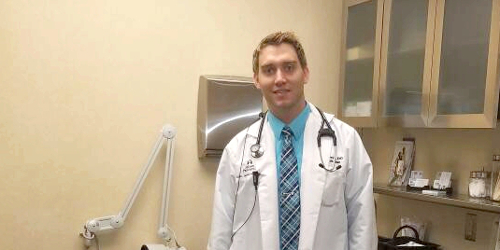
Dr. William Powers, DO, is well ahead of many practitioners in the state of Michigan when it comes to understanding and supporting LGBTQ healthcare issues. Specifically, he is addressing the biggest deficit – comprehensive care for transgender patients.
"People forget that trans people are people, and people get sick," said Powers, 31. "Not every visit involves hormones. Trans people come in with sinus infections. They have high blood pressure. Trans women die of breast cancer because they take high levels of estrogen their whole lives and no one ever gives them a mammogram or a DEXA scan, a bone density test. Trans men get cervical cancer. Doctors assume trans men are lesbians and are only sexually active with females, so they don't do any usual testing they would do for a heterosexual female. That is not the case. They need pap smears. As long as they have the organ, they still need to have the test."
Powers added, "If you have testicles, I need to do an annual testicular exam and hernia check. I have to do that and these patients who are terrified to go into their doctor and tell them who they are don't get the care and preventative screenings they need. So it's not so much what trans patients walk in with. They walk in with the same stuff that everybody else does, but no one really thinks about that."
The Journey Here
Powers started thinking about it four years ago when a transgender man was referred to him by another patient during his residency with the Detroit Wayne County Health Authority at the Family Medical Center of Michigan in Carleton, a rural community where secrecy was a huge barrier when treating LGBTQ patients.
Powers graduated from the University of Pittsburgh in 2007 with a B.S. in Neuroscience. He attended medical school at the Lake Erie College of Osteopathic Medicine.
His attending physician, Dr. Jessica Sharon, DO, was supportive, which Powers said was "super cool. The idea of a resident doing this kind of thing in that area was unheard of. She said, 'If you get the training to do this and are certified to do it, I will oversee it and we can do this here.'"
Powers caught on quickly to the process of treating transgender patients with hormones in compliance with the World Professional Association for Transgender Health (WPATH) guidelines and with a transgender class certification from Affirmations in Ferndale.
"After the first patient, they just kept coming and from places as far away as Traverse City and Kalamazoo. Literally across the state in search of a doctor willing to do this," he said. "When I planted the flag outside, and they knew it was a safe space to go, then I couldn't stop them. This deluge of people who started pouring in out of nowhere — it just exploded."
His staff was "wonderful" and critical to his success as they helped him develop a way within their computer system to create pop-up notifications so they could address transgender patients with their preferred name or pronouns.
Powers established relationships with about 40-50 transgender patients by the time he graduated from FMC, where he was chief resident and was nominated for Michigan Osteopathic Association resident of the year for his transgender medicine clinic. During his third year in residency, out of 75 cases he was the winner of the MOA 2016 Outstanding Case award for discovering Median Arcuate Ligament Syndrome in a young girl who was misdiagnosed with anorexia after seeing 15 different gastroenterologists and racking up around 40 emergency room and hospital visits.
"I had a great application. In my curriculum vitae it said, 'I do this, and this is the thing I'm going to do and I'm going to bring these people with me,'" said Powers who believes this is the reason he could not get a job.
"Weeks went by. One place said, 'We don't feel comfortable with that happening here.' The other place said, 'We just don't really want those people in our office. They have a lot of social problems, they have crappy insurance and we don't want those people in our lobby.' And they are allowed legally to do that because in Michigan trans people are not protected under our laws," he said.
"So I went to Affirmations and told Kelsey Hug – who worked there at the time – basically listen, you guys always ask for LGBTQ providers to treat people and treat them well. I did this and now I'm being punished for it. Help me. I can't find a job. No one will hire me."
Powers' intention of helping the LGBTQ community has always been met with resistance until now. For the last two months, he has been working at the Be Well Medical Center in Berkley.
Breaking Down Barriers
Powers had eight transgender patients in one day, for example, out of the 20 or so he typically schedules.
"Everyday I see more and more patients coming from other providers who offer really poor care," he said.
"People who have been on estrogen for a year or longer with no blockers. People who are on a subtherapeutic dose of testosterone. People who have polycythemia that hasn't been checked or monitored in forever. People from the street who didn't have access to care and are self-treating. I'm cleaning up their regimen and getting them safe."
Powers is board certified in Family Medicine, but has not yet acquired his HIV certification. He is slowly becoming an HIV specialist treating a lot of patients for HIV under the supervision of Dr. Paul Benson, DO, at BWMC.
"I have mentored medical students and physicians in training since I opened my medical practice in 1980, especially to those having an interest in serving the LGBTQ community," said Benson.
"It's also been fulfilling educating and exposing those trainees naive to our community. It was a different world back then with so much stigma, especially to HIV. All of my providers have benefited from my years of experience by discussing care plans, telling personal experiences, developing cutting edge therapies especially in the area of HIV, and from having a large base of grateful patients. We really work together as a team with lots of communication, education and a touch of humor. This unique combination, especially with the diversity of the practice, has made it beneficial for all people served.
Powers said he regularly treats members of the BDSM community that frequent the Detroit House of Pain, for example.
"They don't feel like they can go to a doctor when they suffer injuries during play. They don't get treated because many doctors assume they are under abuse. They can't just explain, 'Hey, we did this hook thing and we need to be stitched up.' They risk infection and don't get care because they are embarrassed," he said, adding that he is also registered with the National Coalition for Sexual Freedom to better connect with the polyamorous community.
"I just don't care. I'm so shocked that it's hard to find a doctor," said Powers, a happily married heterosexual man with three cats – a Savannah named Arcturus, a Maine Coon named Cygnus and a Bengal named Sirius.
"It's not really my business what people want to do with their lives. I just want them to do it safely and live happy, healthy lives. That's my job as a doctor. It's not my job to decide how people choose to spend their 70-plus years on Earth or judge them for it. It's so silly to me that that's been a problem. I know I'm probably the irrational, weird one," said Powers, who is a self-proclaimed "geek" that loves electronic dance music, plays video games, and hangs out at the Catfe Lounge, part of the Ferndale Cat Shelter where he is president.
"I'm a regular person. People have this idea that doctors are robots in white coats that aren't humans that are approachable."
To show he cares further, Powers works diligently to find ways to save money for patients.
"I use a sliding fee scale for cash payers with no insurance. We have a nurse care manager on staff to help try and set patients up with Medicaid or other forms of insurance based on their situation."
A pixel laser used to remove acne scars, for example, which transgender men sometimes get when taking testosterone is a third of the cost at BWMC than most dermatologist's offices.
"We offer free consultations with our esthetician. We offer laser hair removal and other cosmetic procedures also," he said.
"We try and offer these things to trans people so they understand that they shouldn't have to go to an endocrinologist and this doctor and that doctor for something as simple as hormones," he said. "Hormones are not that complicated to prescribe and monitor. Dealing with diabetes is more of a beast than trans hormones. It's not hard. And I don't really care if my patients pass. That's not important to me. I usually ask my new patients, 'Do you care if you pass?' because I don't, but if you want me to help you pass, and you want me to give you advice and information, I can do that. More doctors should do it. I welcome the competition. It would be good for the populace."
But they don't. He said, "They're afraid of it and it's confusing. There's this stigma associated with it that somehow it's this big complicated thing."
So, what if there was more education provided in medical school?
"We would literally do fine. There is a complete lack of training, zero, aside from what I sought out myself. People are not talking about it," he said.
In an effort to change that, Powers welcomes medical students and nurse practitioners to come and train with him at the office. He said, "I am happy to teach these providers for the future so it stops being as bad as it is."
The Be Well Medical Center is located at 1964 W. 11 Mile Road in Berkley. To schedule an appointment, call 248-544-9300. For more information, visit their website.










